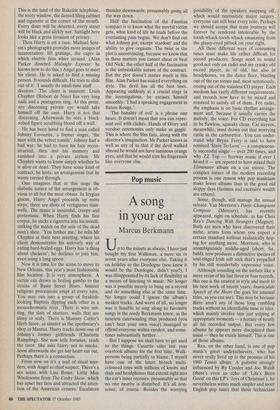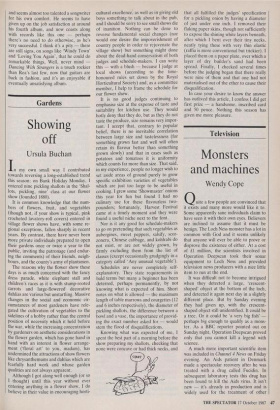Pop music
A song in your ear
Marcus Berkmann
Up to the minute as always, I have just bought my first Walkman, a mere six or seven years after everyone else. Taking it on holiday to the Dordogne (you knew it would be the Dordogne, didn't you?), I was disappointed by its lack of flexibility as a means of listening to music. No longer was it possible merely to bung on a record and do something else at the same time. No longer could I ignore the album's weaker tracks. And worst of all, no longer was it feasible to sing along to favourite songs in the reedy Berkmann tenor, as the tuneless caterwauling thus produced (you can't hear your own voice) managed to offend everyone within earshot, and some- times substantially further.
But I suppose we shall have to get used to the things. Cassette sales last year overtook albums for the first time, Walk- persons being partially to blame. I myself have one of the latest hi-tech multi- coloured ones with millions of knobs and dials and headphones that extend right into the ear's inner recesses, presumably so that no one nearby is disturbed. It's all non- sense, of course. Besides the worrying possibility of the speakers snapping off, which would necessitate major surgery, everyone can still hear every note. Perhaps we should accept that train journeys will forever be rendered intolerable by the toosh-whack-toosh-whack emanating from the glassy-eyed pillock on your right.
All these different ways of consuming tunes must make life rather difficult for record producers. Songs need to sound good not only on radio and my cranky old record player, as of old, but also in headphones, on the dance floor, blasting out of the car stereo and, most notoriously, oozing out of the stainless CD player. Each medium has vastly different requirements, and records now have to be mixed and remixed to satisfy all of them. For radio, the emphasis is on basic rhythm arrange- ment and, because it usually carries the melody, the voice. For CD everything has to be flawless, squeaky clean. Car stereos, meanwhile, must drown out that worrying rattle in the carburettor. You can under- stand why Bryan Ferry is said to have remixed 'Slave To Love' — a conspicuous- ly successful single — over 200 times, and why ZZ Top — freeway music if ever I heard it — are reputed to have mixed their Eliminator album on a car stereo. The complex nature of the modern recording process is one reason why pop musicians Take fewer albums than in the good old sloppy days (laziness and excessive wealth are others).
Some, though, still manage the annual release. Van Morrison's Poetic Champions Compose (Mercury) has recently appeared, right on schedule, as has Chris Rea's Dancing With Strangers (Magnet). Both are men who have discovered their niche, artists from whom you expect a certain standard without realistically hop- ing for anything more. Morrison, who is unambiguously middle-aged (short, fat, bald), now produces a distinctive species of soul-tinged Irish soft rock that's propelled by his still wonderfully expressive voice.
Although sounding on the surface like a mere rerun of his last three or four records, this one is the nearest in style and merit to his best work of recent years, Inarticulate Speech of the Heart (he goes for unusual titles, as you can see). This may be because there aren't any of those long rambling tracks without an identifiable tune or idea, which mainly involve him just yelping at appropriate moments — a feature of nearly all his recorded output. But every few albums he appears more disciplined than usual — then he excels himself. This is one of those albums.
Rea, on the other hand, is one of pop music's great underachievers, who has never really lived up to the promise of his 1980 Tennis album. A guitarist strongly influenced by Ry Cooder and Joe Walsh (there's even an echo of 'Life's Been Good' on this LP's 'Joys of Christmas'), he nevertheless writes much simpler and more English pop tunes that those technicians and seems almost too talented a songwriter for his own comfort. He seems to have given up on the job satisfaction at around his fourth album, and now coasts along with records like this one — perhaps there's no need to do otherwise, as he's very successful. I think it's a pity — there are still signs, on songs like 'Windy Town' and 'Loving You Again', that he could do remarkable things, Well, never mind — Dancing With Strangers is a touch rockier than Rea's last few, now that guitars are back in fashion, and it's an enjoyable if eventually unsatisfying album.



























































 Previous page
Previous page